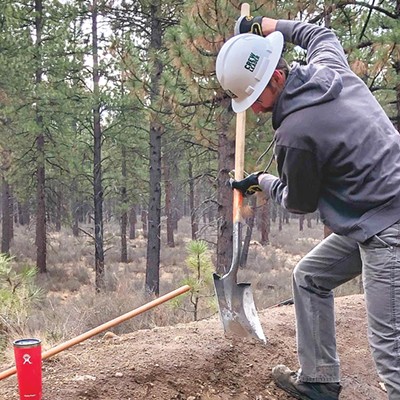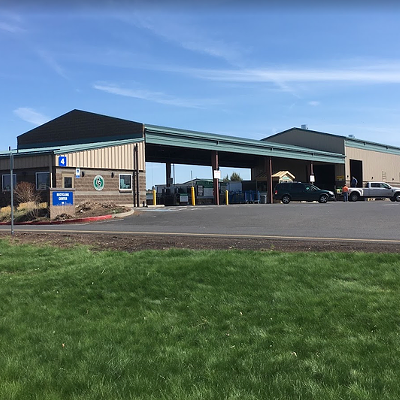For the past several years, public debate has seesawed between keeping the Newport Avenue Dam and, with it, Bend's iconic Mirror Pond, or removing the structure and letting the Deschutes River run free. The city and park district have formed committees, conducted surveys, and spent hundreds of thousands of dollars as well as countless hours assessing potential solutions.
A main sticking point in the conversation has been whether Pacific Power, the utility company that owns the 103-year-old dam, would continue to maintain the structure that holds back the Deschutes River and forms Mirror Pond. If they chose to bail, it would potentially tip the conversation toward dam removal—a possibility that became very real this October when the dam sprung its third leak in five years. But, if Pacific Power chose to hold onto the antiquated dam, that certainly could have bolstered the argument for maintaining Mirror Pond as is. Really, Bend has been holding its breath, waiting for Pacific Power to make a move, and let the conversation flow forward.
On Monday, that answer came—at least partially—when the utility company announced they were done with the dam. It had become too expensive to operate and repair the dam, officials said. The time had to come to explore how to offload or decomission the dam and its hydroelectric facility.
But just as quickly, Bill Smith, developer of the Old Mill District, and Todd Taylor, CEO of heavy construction company Taylor Northwest, slapped their trump card on the table. Without any fanfare or public announcement, the pair had recently joined forces and signed an agreement to buy the land under Mirror Pond from the McKay family—all for the express purpose of maintaining Mirror Pond. (To add yet another question mark to the storyline, proof of the McKay's alleged ownership remains dubious.)
"It is our goal is to retain the pond," Taylor told the Source. Taylor and Smith recently formed a company, Mirror Pond Solutions LLC, in order to "protect the integrity of Mirror Pond at its historic water mark."
Yet, in spite of their stated intent, the bold move has frustrated many of the parties involved with the debate thus far.
"It seems like it's 'my way, or the highway,'" said Michael McLandress, the former Mirror Pond project manager who was let go when Bend Park & Recreation District funding for the position dried up. "It certainly flies in the face of public process," McLandress added.
Such a process, McLandress explained, is important for a number of reasons—like maintaining a democratic process. But public process also has significant implications for future funding sources. If, McLandress said, there's a private derailment that ignores public involvement, the city may lose a shot at state and federal grants.
What's more, the potential purchase of the pond—or, at least the land underneath it—fails to resolve the central problem of who will maintain the dam, if Mirror Pond is to remain.
"I don't think that it matters who owns the mud," said Ryan Houston, executive director of the Upper Deschutes Watershed Council, referring to the land under Mirror Pond. "But rather who owns the dam and the huge expense of keeping the dam if it were to stay."
Houston went on to outline a number of problems that would still need to be addressed should the City of Bend or the Bend Park & Recreation District choose to take over ownership of the dam—a very real option, given Pacific Power's recent announcement. Among them: fish-passage modification (which, according to reports from the UDWC, would cost between $1 and $2 million) and repairs (the dam is over a century old and currently leaking).
There are also legal questions swirling around the water rights attached to the dam and its usage. Namely, there's no built-in right for storing water. According to waterright certificate No. 29581, Pacific Power only has the right to use the water for power generation and ice and debris removal.
Retiring the dam from its power-generating duties—but retaining the structure to keep a pond aesthetic—could be dicey, said Kyle Gorman, the Oregon Water Resources Department south central regional manager. To his knowledge, it's never been done before, though an opportunity, he said, may exist. That opportunity, though, would be subject to a public process and a state-sponsored review to ensure no injury to other water right holders occurred. "It's very complicated," Gorman added.
Racquel Rancier, a public information officer with the Water Resources Department concurred. "We'd have to consult with our legal counsel and determine what options—if any—would be available."
One thing is certain, however—Pacific Power wants nothing to do with the failing dam, a sign Houston said should tip off other potential owners. Mark Tallman, Pacific Power's vice president, recently stated that it wouldn't be cost effective to repair and continue operating the dam. Pacific Power, it seems, is going to do all that it can to offload the structure on another entity, rather than be forced to remove the dam and restore the surrounding land.
Mayor Jim Clinton, though, said he's not in favor of taking over ownership.
"I certainly wouldn't support—and I think a lot of others with the city wouldn't support—blindly taking over the dam and incurring all that liability," said Clinton. "Whoever owns the dam has some serious problems in the future."
The next public Mirror Pond Ad Hoc Committee Meeting is from 3-5pm Dec. 2 at the Bend Park and Rec. District Office.



























